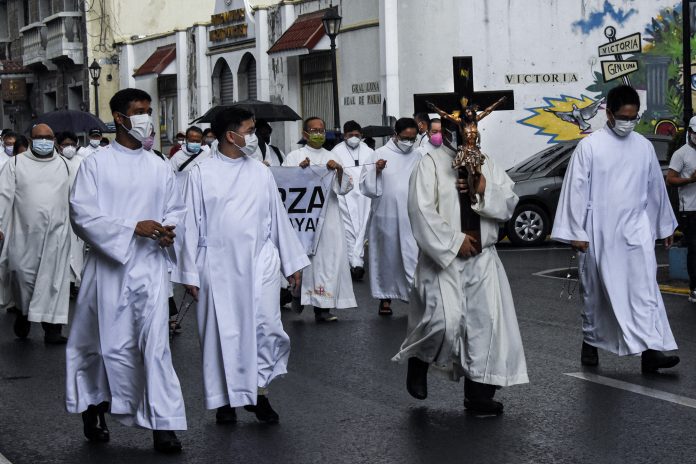These ten questions, and answers, aim to clarify issues confronting Filipino Christians, Catholics in particular, ahead of the country’s national elections in May 2022.
Should the Church get involved in politics?
We have heard this for the longest time: the Church should never get involved in politics because it is a violation of the “separation of the Church and State.” We need to settle this once and for all.
There is no such prohibition in the Church. Such prohibition is a Constitutional injunction for the State, not for the Church. First, it states that the State shall not pass laws establishing any religion (Art. III, Sec. 5).
Second, the State shall not pass laws prohibiting the free exercise of any religion (Art III, Sec. 5). These are called the “non-establishment clause” and the “free exercise” clause. In short, only the State can violate it, not the Church or any Church personnel.
When Duterte and his government criticize the Church for violating the separation of Church and State, they are “barking at the wrong tree.”
On the contrary, it is the role of all citizens—Churches and their members included—to call out the State authorities when they favor one religious group over another or prohibit some religions the free exercise of their beliefs.
In Fratelli Tutti, Pope Francis writes: Politics is “one of the highest forms of charity, inasmuch as it seeks the common good” (FT 180). “A good Catholic meddles in politics so that those who govern can govern well.” This is not new; he was just quoting Pope Paul VI in Evangelii Nuntiandi (1106) and earlier popes on the notion of political charity.
But because of the strong influence of the dualistic view of Christian spirituality with regard politics, I observe several kinds of Christians in our times:
(a) apolitical Christians — those who think that their home is in “heaven” and what happens in this “world” is of little or no value at all;
(b) neutral Christians — those who follow the minimum requirements of political duties like the elections but consider it a “private affair;” when it is a question of injustice, they are neutral;
(c) non-neutral but non-partisan — those who call out society on human rights violations as against Christian principles but refuse to name names or promote partisan candidates;
(d) non-neutral and partisan — those who engage in social and political issues and get involved in partisan politics.
Based on the majority of church documents, the third type (non-neutral but non-partisan) is the place for the religious and clergy. The fourth type (non-neutral and partisan) should be the responsibility of the laity.
Does the proper “religious mission” of the Church prohibit the clergy from engaging in politics?
Vatican II documents and Canon Law are used by many writers to prove that the clergy cannot engage in politics because the Church’s proper mission is “religious.”
Based on these quotations (and their parallels in other church documents), the conclusion is that bishops and priests cannot engage in partisan politics. Doing otherwise would be “crossing the line,” as one author suggests.
- “Christ, to be sure, gave his Church no proper mission in the political, economic, or social order. The purpose which He set before her is a religious one.” (GS, 42)
- “The Church, by reason of her role and competence, is not identified in any way with the political community nor bound to any political system. She is at once a sign and a safeguard of the transcendent character of the human person.” (GS, 76, Canon 2245)
Let us unpack this assertion in the context of the Vatican II spirit.
First, the “Church” is not equal to the bishops and the clergy. To use the same Vatican II documents, the Church is the “whole people of God” — lay, religious and clergy. So, to describe the Church’s mission as “religious” actually refers to the Church as a whole body, as a whole institution. To restrict its meaning to the clergy is the height of clericalism.
Second, if we read Gaudium et Spes closely, its purpose is to find the role of the Church in the “modern world.” To separate the Church from the world of politics or economics is against the spirit of Vatican II. In fact, after the assertion that the Church’s role is a religious one, a crucial text follows:
“But out of this religious mission itself come a function” in the social, economic, political world. The following chapters talk about these Christian duties in the world — development of culture (Ch 2); economic life (Ch 3); politics (Ch 4); promotion of peace (Ch 5). This is practically the whole of Gaudium et Spes.
To advance a sense that the Church should not be engaged with the secular because its mission is “religious” is not contemplated by Vatican II. GS 43—the very next item from that which has been often quoted—has a very important reminder: “The split between the faith which many profess and their daily lives [in the cultural, economic and political worlds] deserves to be counted among the more serious errors of our age” (GS 43).
This dualism is not helpful for the Church. On the one hand, it reinforces a dualistic and truncated spirituality which is reflected among many today—both clergy and laity. On the other hand, it is now instrumentalized by power holders to curb dissent and demand for accountability by combining it with the notion of the “separation of the Church and State.”
Father Daniel Franklin Pilario, C.M. is a theologian, professor, and pastor of an urban poor community in the outskirts of the Philippine capital. He is also Vincentian Chair for Social Justice at St. John’s University in New York.









